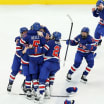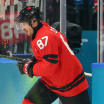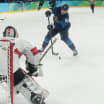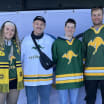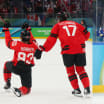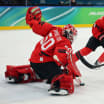Lindberg 'blown away' by Lester Patrick honor
Longtime supporter of USA Hockey will receive award on Dec. 13
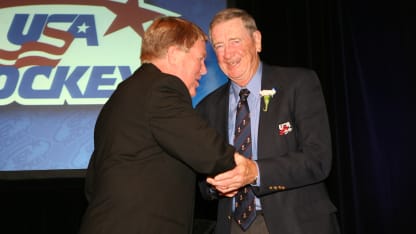
One of those people is Peter Lindberg, who has spent the past six decades in a support role for hockey in the United States, and for those contributions was named a recipient of the Lester Patrick Trophy for contributions to the game in the U.S.
He'll be presented with the award, along with former USA Hockey executive director Dave Ogrean, during the United States Hockey Hall of Fame Induction Celebration at the Westin Boston Waterfront hotel Dec. 13.
"The global stature of American hockey has been advanced immeasurably by the contributions of Peter Lindberg and Dave Ogrean," NHL Commissioner Gary Bettman said. "While I'm sure they feel it is rewarding enough that more Americans than ever are playing our sport, and succeeding across all disciplines and age groups, honoring Peter and Dave with the Lester Patrick Award provides recognition of their extraordinary efforts through decades of dedicated service."
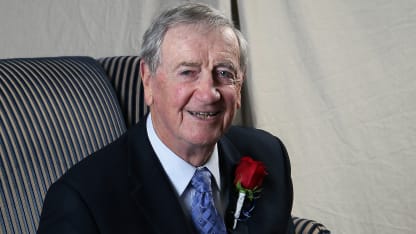
Lindberg, 82, said he had no idea the award was something he would be considered for.
"I was absolutely blown away," Lindberg said. "When Gary Bettman called and said we have decided we're going to give you the Lester Patrick Award, I said 'this is a joke, isn't it?' … I look at the roster of people that have received this award and it's rarefied air."
But for those that know Lindberg, the award, named after one of the sports pioneers, is a worthy honor for all he has contributed, from his days with the Edina (Minnesota) Hockey Association in the 1960s through his time with USA Hockey.
"If you talk to anyone who's been in USA Hockey … the impact of Pete Lindberg and his presence and his ability to calmly work through some issues that we were facing and had to face in different situations that had to do with litigation or compliance or just providing a better environment for the players and participants to do what they need to do, they would know who Pete Lindberg is," said Ron DeGregorio, former president of USA Hockey and currently chairman of its board. "He had a great impact on our association for many years."
Lindberg started his relationship with hockey as a 5-foot-4 goaltender at St. Louis Park (Minn.) High School.
"A classmate of mine when he was a freshman made the team," Lindberg said. "I said that's a good idea for me. We went down in his basement, and he pounded tennis balls at me for about three months. I got my reflexes going pretty well."
However, an injury to his left eye during his junior year ended his playing career. He was standing in the corner during warmups when an errant puck hit him in the face.
"I had a pretty good scar across the retina for decades and altered vision," he said.
Lindberg's path led him to an undergraduate and then a law degree from the University of Minnesota. He began working at a law firm in Edina and got involved with the city's youth hockey program as a coach.
He rose to become president of the Edina Hockey Association, and then became involved with the Minnesota Amateur Hockey Association (MAHA), known today as Minnesota Hockey. He was elected president in 1983, which led to him working with USA Hockey's forerunner, the Amateur Hockey Association of the United States.
When his term with MAHA ended in 1986, he was appointed USA Hockey's first Legal Council Chairman, and held the position until he retired in 2014. Among the initiatives he and his department helped create were programs that helped increase on-ice player safety and equipment upgrades, mandated locker room monitors at the youth level to prevent hazing and other issues, and created the discipline and appeals process for coaches and players at the national and local levels.
When Lindberg was volunteering in hockey, he was building a legal career that saw him rise to become one of the leading jurists in Minnesota. He spent more than 25 years as the Fourth Judicial District Judge for the state, including three years as Chief Judge. He also spent a year as a judge on the Minnesota Court of Appeals.
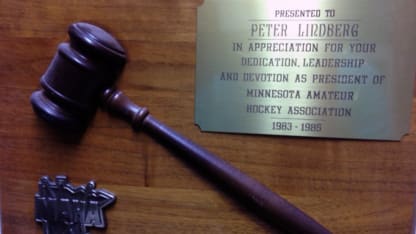
"When you draft legislation or policy issues that impact people … we're in a litigious world," Lindberg said. "You need to cautiously draft language that encompasses the problems that you're trying to solve while not going overboard or not doing enough. For me it was a major assistance because I would look at something and say, 'you can't do that, that language won't work.'"
Although Lindberg's work went unnoticed by the general hockey public, it was invaluable for the stability and growth of USA Hockey.
"He was so important in terms of what we needed for structure," DeGregorio said. "He was so instrumental in fashioning bylaws and statutes so that it was protective of the players. He was very instrumental in being able to articulate to all of us certain needs, that we had to have those kinds of provisions in our statutes and bylaws. He was a special person.
"Getting people on the ice is important, but how we as an organization protect their interest is really a key point for his attention. How do we make sure that what we're doing is proper and correct? We have several disciplinary issues that come up, we think that's not so important, it's great when you have someone who is a [state] supreme court judge writing the decisions after hearings and making sure that due process is followed to the letter.
"We didn't have many issues around the compliance of fair hearings and fair adjudications and proper procedure being followed. That may seem small but there are issues that come up and issues that are not so simple, it's wonderful to have someone who has a clear legal mind. He was an articulate writer and his decisions were wonderful and his decisions held up. It reduces the distractions to other things that happened in the organization."
Lindberg's work also brought him into contact with the United States Olympic Committee (USOC) and the Court of Arbitration for Sport (CAS). His work with the USOC was mainly geared toward making sure USA Hockey remained in compliance with U.S. law as well as International Olympic Committee edicts.
He was one of 200 arbitrators worldwide during his 16-year tenure with CAS.
"That was an interesting and challenging part of my career," he said. "It was very prestigious for me. I really felt honored to be able to do this."
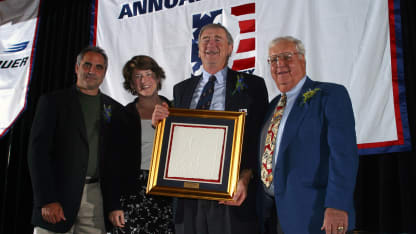
Lindberg retired from the bench in 2000 when he turned 65, and while he no longer chairs USA Hockey's Legal Council, he remains involved with the organization.
"I'm a director emeritus," he said. "I have volunteered to serve on two committees, the risk management committee and the safety and protective equipment committee, just to keep a hand in. I've got a wealth of information that would be useful to them. Your voice is heard but you don't have a vote."
Lindberg said he'll have a number of friends and family members in Boston, including three grandsons, plus some friends from Massachusetts hockey programs.
"This is a high honor," he said. "This is similar to getting the [Stanley] Cup. To get the Lester Patrick, this is high-level stuff. I'm still kind of blown away at the thought of it. It's way, way up there for me. Can't tell you how honored I feel. … When I started this back in '59 with the [Edina] hockey program, rating kids for tryouts, not even close to a thought."




